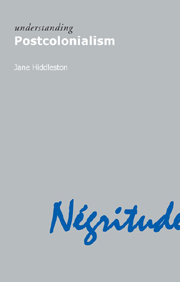
-
The digital format of this book is no longer available to purchase from Cambridge Core. Other formats may be available.
-
Select format
-
- Publisher:
- Acumen Publishing
- Publication date:
- 05 February 2013
- 30 March 2009
- ISBN:
- 9781844654284
- 9781844651603
- 9781844651610
- Dimensions:
- Weight & Pages:
- 00kg,
- Dimensions:
- Weight & Pages:
- 00kg,
- Subjects:
- Philosophy, Political Philosophy
You may already have access via personal or institutional login- Subjects:
- Philosophy, Political Philosophy
Book description
Postcolonialism offers challenging and provocative ways of thinking about colonial and neocolonial power, about self and other, and about the discourses that perpetuate postcolonial inequality and violence. Much of the seminal work in postcolonialism has been shaped by currents in philosophy, notably Marxism and ethics. Understanding Postcolonialism examines the philosophy of postcolonialism in order to reveal the often conflicting systems of thought which underpin it. In so doing, the book presents a reappraisal of the major postcolonial thinkers of the twentieth century. Ranging beyond the narrow selection of theorists to which the field is often restricted, the book explores the work of Fanon and Sartre, Gandhi, Nandy, and the Subaltern Studies Group, Foucault and Said, Derrida and Bhabha, Khatibi and Glissant, and Spivak, Mbembe and Mudimbe. A clear and accessible introduction to the subject, Understanding Postcolonialism reveals how, almost half a century after decolonisation, the complex relation between politics and ethics continues to shape postcolonial thought.
Reviews
"A valuable introduction to postcolonial philosophy and its poststructuralist philosophical foundations, a clear overview of important debates, and succinct, precise definitions of essential terminology related to the field. . . It represents, too, a significant intervention because of the innovative comparisons drawn between Francophone, Anglophone, and Latin American postcolonial thought. Overall, Understanding Postcolonialism will be a 'must' for newcomers and more experienced readers of postcolonial philosophy alike."
Source: French Studies
Contents
Metrics
Altmetric attention score
Full text views
Full text views help Loading metrics...
Loading metrics...
* Views captured on Cambridge Core between #date#. This data will be updated every 24 hours.
Usage data cannot currently be displayed.
Accessibility standard: Unknown
Why this information is here
This section outlines the accessibility features of this content - including support for screen readers, full keyboard navigation and high-contrast display options. This may not be relevant for you.
Accessibility Information
Accessibility compliance for the PDF of this book is currently unknown and may be updated in the future.


